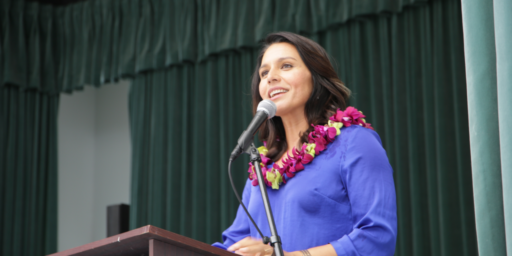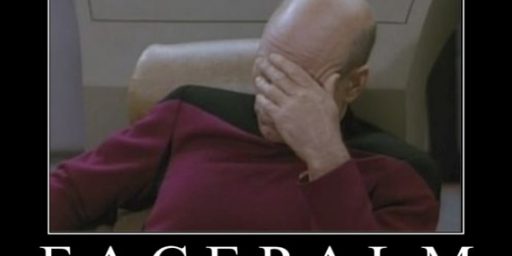Citizen Journalism and the Future of News
Media Bloggers Association president Robert Cox argues in a San Francisco Chronicle op-ed that the line between “citizen” and “journalist” has become so blurred as to have all but disappeared.
This issue has reared its head again because of the so-called “Bittergate” episode.
Mayhill Fowler, a maxed-out Obama contributor, was invited to attend a fundraiser in San Francisco that was off-limits to the press despite her being a blogger for the Huffington Post. Fowler openly recorded the senator’s remarks and accurately reported his words. Afterward, Obama campaign officials acknowledged that the event was on the record and that they assumed everything said would be recorded and published. The issue then is not that Fowler did what she did but that there was a negative reaction to what she said that he said.
Some have taken this opportunity to challenge the notion of citizen journalism altogether, asking whether it is appropriate for a “citizen journalist” to attend a no-press event as a “citizen” and then report on the event as a “journalist.”
I’ve been to many “Chatham House rules” (no attribution or disclosure of who participated) events and a handful of off-the-record (no reporting, period) events and have respected those rules. Fowler, though, was under no obligation to refrain from publishing damaging quotations. Indeed, she meant no harm to her candidate.
The past five years have seen unprecedented changes in the media landscape. Bloggers have been credentialed to major political conventions; played a key role in ending the career of a powerful news broadcaster; derailed a major political campaign, thus shifting power in the U.S. Senate; received media credentials to cover a high-profile federal trial; and, most recently, were embedded in presidential campaigns.
The advent of near-ubiquitous recording devices such as cell phones, iPods and digital cameras, combined with Web-based broadcast platforms such as blogs, video-sharing sites and podcasts, means “news” can be broadcast by anyone to anywhere at a speed of thousands of megabytes per second with an audience reach of infinite size – all at little or no cost. The world is only slowly catching up with implications of this new media landscape where any person is potentially gathering news at any given moment.
[…]
The reaction to Fowler’s blog post then is just another bump in the inexorable sorting out of what the First Amendment means in a society where every person with Internet access has his or her own global broadcasting and publishing facility. The issue is less the distinction between “citizen” and “journalist” and more whether the Founding Fathers ever contemplated such a distinction in the first place.
A close reading of the First Amendment and centuries of legal precedent says “no.”
Quite right. There’s a reason that freedom of speech and freedom of press occupy the same space in the Bill of Rights; they’re inextricably linked. Without information to form opinions, the ability to express opinions is meaningless. Conversely, information is useless unless one is free to share one’s opinions.
America’s early journalists were merely citizens interested in the news. There was no such thing as J-School and the concept of credentialing would have seemed absurd. Over time, however, journalism moved from a craft to a profession, with many of the accouterments of the latter. This has been mostly, but not entirely, positive.
Professionalism arose out of a dark period in American media. Yellow Journalism and a tabloid mentality stripped newspapers of any value, since people had no reason to trust what they were reading. A canon of ethics was necessary, including the expectation that reporters attempt to present information objectively and truthfully. Theoretically, at least, opinion was to be clearly labeled and distinguished from factual reportage. In reality, of course, that ideal was never reached. Given that human beings staff newspapers and other media, it was never attainable to begin with.
With Vietnam and Watergate, and later the advent of 24/7 cable news and the Internet, the mentality of the professional media changed. The always present pressure to get “scoops” and “break” stories ratcheted up to new heights and old rules about double checking sources and editorial oversight were loosened in order to accommodate “reporting at the speed of thought.” More importantly, the aspiration shifted from good reporting to doing good. Everyone wanted to be the next Woodward and Bernstein.
The advent of blogs and other self-published media turned us full circle to the days of the pamphleteers. Most citizen journalists are untrained and, frankly, most are rather poor. But it has created ability for more facts to get out (reporting staffs are limited; they can’t be everywhere), more expertise to be brought to bear (it would be almost inconceivable for someone at CBS to have had expertise on 1970’s typewriter fonts, for example), and for more opinions to compete for readers.
Citizen-journalists won’t replace professional journalists. That’s a good thing. We want well-trained, full-time people out there covering the news. But the Army of Davids that Glenn Reynolds described are a welcome addition to the fold.
UPDATE: In “Where’s the Business Model for News, People?” Jay Rosen gives us a short history lesson:
It’s worth going back to the first business model in reportage: the merchants, traders, and other “men of affairs” in early modern Europe who employed letter-writers in cities where the man of affairs did not happen to be located. These letters—the most famous example is the Fugger Letters from the latter 16th century—conveyed much the same news that a trader would want today: prices, conditions for trade and transport, what the local authorities were up to, rumors of war, court news and gossip, natural disasters, and anything the people were seriously buzzed about.
Quality was important, accuracy essential, an ability to interpret and amuse definitely part of the deal. Everything a pro journalist would want an employer to demand, except for one thing. The letters were not intended for public distribution. There was no public then, and “public opinion” was not a phrase in common political use.
He also points to Jeff Jarvis‘ “The press becomes the press-sphere.”
One problem I’ve had with much discussion about the future of news lately is that it’s too press-centric. It focuses on the press as if it were at the center of the world, as if it owned news, as if news depended on it, as if solving the press’ problems solves news. That’s not the ecosystem of news now.
[…]
The press may be involved and may create a news story. But we might have found that via links from our peers who tell us it’s news (“if the news is important, it will find me”). Either of those might have linked to source material from a company or government site — which now plays a press role in adding to the whole of a story. Witnesses can join in the process directly. Background might come via links to archives. Commentary from observers may add perspective. An accumulation of data may alert us to news or augment it. All of these elements add up to news.
That’s a lot more work, though, than watching the evening news, listening to the radio on the way to work, or even reading a daily newspaper. But for information junkies, this is absolutely right: There’s a ton of outstanding content out there and myriad ways to reach it. Indeed, while I subscribe to Jarvis’ blog via RSS, I’d missed this piece but stumbled upon it two weeks later via Rosen.






I’m not convinced this isn’t a good thing, because I’ve never seen any reason to consider the press to be anything other than mere citizens.
Well, let’s be precise. This issue came up because Obama supoprters don’t like him being held up to what he says. Despite implications to the contrary that was not ‘yellow journalism’ Unless you’re going to suggest the tape of what he said was edited somehow)… No, that was reporting.
The first amendment applies to us all equally, and as far as my reading can take me, I’ve never noticed where there was any special place in the hearts of the founders for the press. Far as I can see, the press were and are citizens. If we grant special rights and defferences to the rpess, we end up with the kind of eletist nonsense we’ve seen out of the MSM for decades, now.
No less poor, I’m afraid than what the MSM has been for the last 40 some odd years. But you know what? The marketplace seems to have had an effect on this, if we’re to take the impending demise of the big three, and the NYT, and the poor ratings of MSNBC, and CNN, and the massive rise of Blogs as any indication.
Which brings us to another point; Professionalism. Are CBS/NBC/ABC/CNN/NYT to be held up as professionals? I’m not sure much value can be had from professionalism, if these are the standard.
I should have also suggested that the citizen journalists as you mention who are poor, are similarly blessed with low hitrates. That free market thing again.
And let’s while I think of it, discriminate between ‘journalists‘ and “News people”.
A News person writes down the news. A journalist writes down what he thinks. The biggest problem the press of today has, particularly the MSM I mentioned, is here those lines get blurred.
Look at the definition of journalist in the link I’ve just provided. Nowhere in any of the definitions will you see the word ‘news’. By contrast, look at newsman.
Blogs do not have that much of a problem, for the most part.. I estimate that 90% of the popular political blogs are doing opinion… ie journalism… not news reporting. True, they metnion current events by means of reppeating what the news wires say, but most of heir time and emph is on rendering opinion-oriented analysis on those events. Your blog, James, is that way, and so it mine. I make no pretense to being a news person. I am, however, a journalist by the definitions the dictionary provides us.
Forgive me for posting without reading (both text and comments) … but was just about to log off, and foyst wanted to (uh huh, you guessed it) gander at the caption contest.
Anyway … read the L.A. times a couple of times this past week (atomic copies). And differentiating between it, and a lefty blog was well nigh impossible.
Putting aside that my other local daily (the LA Daily News) reads like a dripping yellow commie rag. Reprinting nothing but AP propaganda, verbatim. And yet still adding their own little regurge to the title or banner. And offering almost no text or reporting of their own (other than local).
I start talking like Dice Clay just thinking about it/them.
There is obviously very little “diversity” when it comes to the “MSM”. I find it to be more along the lines of “discrimination” if you don’t happen to share their leftist worldview. They [the MSM] are nothing more than propagandists, and those that support the so called “fairness doctrine†only do so to advance their leftist agenda.
P.s. I’m a career Soldier and I’m sick and tired of the “loser” media bias in our war on terror. I’m particularly “pissed†about their [MSM] “cherry picking†of disgruntled service members and those [a small minority] that happen to be deluded enough to support the “presses†favored candidate. I’m also disgusted at the way they’ll edit an interview to twist it into what they want irregardless of the facts. Anymore, I find it better just to avoid the lying idiots [journalists] in general.
Would that news reporters would just report the news: if I want analysis, personal views and perspectives and better contextual placement of what an event or series of events in a longer chain actually represent, I do not want a reporter who may only be at one of them. And, as far as reporting goes editors, like Dan Froomkin at the WaPo online are skewing what they find as acceptable that does not match up with the stated and published Code of Ethics of their publication. Those organizations that have such CoE rules and publish them expect to be held to those standards. When an organization clearly doesn’t, like the Israeli attacks on Hezbollah in 2006 involving not only Reuters, but every video organization that played by Hezbollah reporting rules and the ubiquitous ‘Green Helmet Man’ or AP with Jamil Hussein, then the non-accountability of such organizations to actually address their Code of Ethics becomes, for me at least, the point.
Reporting of facts and some minimum on-the-spot setting of ‘news’ items I can live with. When reporters are asked to give their instant analysis or assessment, or given great column space to fill up factual reporting with their ‘views’ and their ‘context’ then I have a severe problem with them. Unless such organizations are willing to put, up front, the bios and published background (not just the light and easy ‘he/she has worked for 5 years at thus-and-such’) so that I can understand the bias of such ‘reporters’ who go beyond factual news reporting and into ‘analysis’ then the basis for having established trust and adhering to any Code of Ethics is diminished. Do that often enough like, for me, AP, Reuters, NYT, WaPo and every three letter to five letter news network have done in not adhering to the reporters responsibilities under the GC or, indeed, be held to *any* accountability, then the question of why I should trust such organizations without seeing them as biased as the ‘Yellow Journalists’ of old is brought up. And at least give the ‘Yellow Journalists’ credit: they were up-front about their bias, openly published editorials stating that for editors and clearly declaimed themselves to be partisan.
I can live with *that* form of reporting! Really, it is more open, honest and transparent than the current MSM and an individual, today, must comb the background of ‘reporters’ to find their prior pieces and examine their bias past and present so as to understand why they are reporting what they report and then to see what they *aren’t* reporting because their bias gets in the way of simple, factual news reportage. I have come to rely upon those individuals who report what they see, are open about their views and bias, and are trying to hand out simple, factual coverage with a minimum of overlay. The only benefit from the large ‘professional’ establishments is that they have been so far spread that simple events, not really earth-shattering or ‘scoops’ are also reported with a minimum of space given to them: brevity requires sticking closer to the facts and gives less room for interpretation. Thus a simple one or two short paragraph article dredged up from the archives of an MSM print outlet from 20 years ago tends to have far more veracity to it than something given 3,000 words and a full-color photo spread today. It is that low-level, background reporting that can help set context for later stories… the problem being you don’t know what those are until years later.
News reporting, on the spot, for things like the London bombing was *not* accomplished by tv news or print media, but by hundreds of people with cell phones snapping pictures and uploading them. Security cameras would give further context, but those were government run not from news organizations. With those setting place, timing and context and a bit of back grounding, the analysts in all realms were starting *equally*, from the same, common set of facts and allowed to work outwards. The Internet, itself, is changing connectivity mode from its early 1990’s ‘portal’ view to the ‘nebular view’ where the majority of links are now happening between individuals. While the old ‘portals’ and MSM sites are still bright, by number of connections, the nebula, itself, by pervasive linking and cross-linking is now putting forward enough light to start drowning them out. The trust, interplay and utilization of news sources is no longer guided by or directed by the MSM, but is now p2p networking where individuals check each other and move ‘stories’ forward. The MSM would do well to become what they claim to be: primary sources of factual information that is widespread, brief and offers little opportunity for bias. It would give them a temporary reprieve from what is happening: they wanted to be gatekeepers, but the fence, itself, is being removed.
Yellow journalism of the period was advocacy journalism. Hence the oft quoted ‘The Spanish American War was Heart’s War’. That is different from todays advocacy journalism how….?
The story goes that Hearst and his ilk simply viewed their papers as a means to make money and as a bully pulpit to stoke the public emotion. They were perfectly willing to make up facts and distort the truth if it served those objectives.
Professionalism put an emphasis on truth telling. Papers were still a business, to be sure, but they held a sacred public trust. When journalists are caught making up facts, they’re drummed out of the corps.
In reality, it was likely never that black and white. But that’s the theory, anyway.
Or should we ask if these “journalists” are “citizens”???
I would go one step further and say that our founding fathers did not even intend to create a “free press” as in a free class of journalists, but to create a constitutional right to print and publish your speech. The printing press, which is what “freedom of the press” refers to, is not the right to be a journalist, but the right to publish and disseminate your speech.